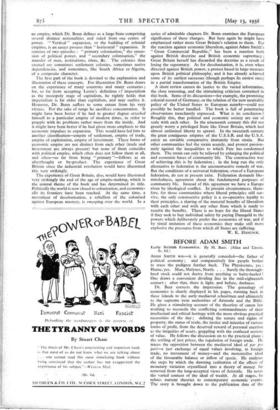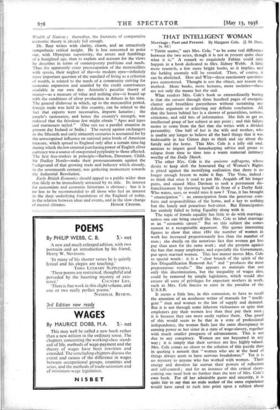BEFORE ADAM SMITH
ADAM SMITH was—it is generally conceded—the father of political economy ; and comparatively few people bother to trace the pedigree further back. The Physiocrats, yes ; Hume, yes. Mun, Malynes, North. . . . Surely the thorough- bred stock could not derive from anything so hairy-heeled ! One draws a convenient dividing line in the mid-eighteenth century ; after that, there is light, and before, darkness.
Dr. Beer corrects the impression. The genealogy of economics is clearly displayed in his pages, running back in these islands to the early mediaeval schoolmen and ultimately to the supreme twin authorities of Aristotle and the Bible. He gives a stimulating account of the theorists of canon law working to reconcile the conflicting commandments of their intellectual and ethical heritage with the more obvious practical necessities of the day ; defining the nature and rights of property, the status of trade, the justice and injustice of various forms of profit, from the deserved reward of personal exertion to the iniquities of usury, grappling with the confused notions of value. He follows the discussion on to the practical plane ; the settling of just prices, the regulation of foreign trade. He traces the opposition between the mediaeval ideal of par pro pari—a just exchange of equal values involving, in foreign trade, no movement of money—and the mercantilist ideal of the favourable balance or inflow of specie. He analyses the steps by which the dawning realisation of the effects of monetary variation crystallised into a theory of money far removed from the long-accepted views of Aristotle. He notes the varied content of the ideal of wealth. At all stages, he relates current theories. to contempOrary economic :events. The story is brought down to the publication date of the Wealth of Nations ; thereafter, the literature of comparative economic theory is already full enough.
Dr. Beer writes with clarity, charm, and an attractively sympathetic critical insight. He is less concerned to point out, with Olympian superiority, the errors and fumblings of a benighted age, than to explain and account for the views he describes in terms of contemporary problems and needs. Thus the apparently crazy preoccupation of the mercantilists with specie, their neglect of the—to modem eyes—infinitely more important question of the standard of living as a criterion of wealth, is related to the needs of a community striving for economic expansion and unaided by the credit contrivances available in our own day. Aristotle's peculiar theory of money—as a measure of value and nothing else—is bound up with the conditions of silver production in Athens in his time. The general disfavour in which, up to the mercantilist period, foreign trade was held in this country, can be related to the fact that exports were necessaries, imports luxuries ; the people's sustenance, and hence the country's strength, was reduced that the frivolous few might obtain " Apes and japes and marmosets tayled." (One can see a parallel situation in present day Ireland or India.) The outcry against exchangers in the fifteenth and early sixteenth centuries is accounted for by the unrecognised influence on national price levels of American treasure, which spread to England only after a certain time-lag during which the low external purchasing power of English silver currency was a source of exasperated perplexity to those affected. The first free-traders in principle—Barbon, Davenant, Child, Sir Dudley North—make their pronouncements against the 1:-ickground of that growing trade and industry which already, in the seventeenth century, was gathering momentum towards the Industrial Revolution.
Early British Economics should appeal to a public wider than that likely to be immediately attracted by its title. Its interest for economists and economic historians is obvious ; but it is no less to be recommended to all those who feel an interest in the deep underlying foundations of the England of today, in the relation between ideas and events, and in the slow change















































 Previous page
Previous page